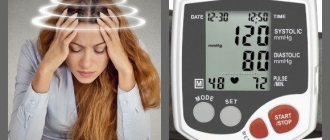The nature of dizziness consists of two types
If a person feels dizzy but their blood pressure is normal, a doctor should determine the cause by considering the options for peripheral and central dizziness. Both types are considered as a pathology that poses a health hazard. A particular danger lies in systematic symptoms over a long period. The doctor must check all versions and suspicions in order to decide what to do next and determine why the patient is suffering from such an illness.
1. Peripheral dizziness is of a vegetative nature and may be accompanied by tachycardia and sweating. After an attack, recovery occurs quickly and all symptoms disappear. The vestibular analyzer is not impaired in peripheral vertigo.
2. Central vertigo. The head begins to spin sharply, weakness and imbalance of the body are felt. The attacks are repeated frequently and are complicated by speech and motor disorders on one side of the body. When this happens, the patient may experience double vision. Central vertigo may be a warning sign of problems with the brain.
Features of appearance
Dizziness and headaches with otitis media are conventionally divided into several categories, according to which the doctor may suspect one or another ear pathology:
| The nature of the discomfort | Features of appearance |
| wavy | Cloudiness in the head occurs periodically, mainly when changing body position or sudden movements. It usually appears against the background of acute otitis media. |
| Intense and long lasting | Accompanied by vasospasm, disorientation in space, and loss of coordination of movements. Even basic small manipulations with your hands become difficult. The problem most likely lies in the labyrinth and is rapidly progressing. |
| Aching, weakly palpable | Mild dizziness is not accompanied by significant vestibular disorders. The headache is not severe, there is discomfort in the ear, some hearing loss. Clear signs of chronic pathology or the development of complications after untreated otitis media. |
Often, dizziness is a residual phenomenon after an infection or acute otitis media. Mild swelling of the nasopharyngeal mucosa irritates the vestibular receptors, which leads to incorrect nerve impulses in the brain. The symptom goes away on its own as you recover.
An individual feature of the venous blood flow, when the outflow of blood from the ear labyrinth is disrupted, causes swelling and, consequently, dizziness.
Physiological causes of dizziness and
1. Nervous state. During stress, adrenaline in the blood increases greatly in a person, at this time a strong vascular spasm occurs, and a sufficient amount of blood does not flow to the brain.
2. False perception of reality. When the brain thinks one thing, but something completely different happens. This happens when riding on carousels, swings, in transport, when driving at speed, when flying on an airplane or sailing on a ship. A severe headache or dizziness can accompany a person every time he travels on public transport. It is not normal. You should tell your doctor about the problem. Having an accurate history will help determine the causes of the disease.
3. Problems with focusing your eyes. When you look into the distance for a long time, everything begins to spin before your eyes.
4. When a person lacks adequate nutrition. At this time, the blood does not receive glucose in the required quantity. In this case, not only does the head feel dizzy, but weakness is also constantly present. The patient may vomit frequently. It is necessary to adjust the diet.
5. In case of circulatory problems. As a result of sudden movements (standing up, straightening up, turning his head, etc.), coordination is often impaired, and subsequently the patient feels nauseous.
6. The causes of dizziness may include taking certain medications: antibiotics, sedatives and antiseptics. Due to drug treatment, a person may experience severe nausea.
Drug treatment of a pathological condition
If there is noise in the head and at the same time there is swelling of a light yellow hue under the eyes, the iridescent contour of the eyes is bordered by a light gray thin arc, then the cause of the discomfort lies in atherosclerosis. A specialist will tell you what to do, but the main recommendation is the same - take drugs such as “Atheroblock”, “Vitrum Cardio Omega 3”.
DETAILS: How many heart attacks can a person suffer?
| Name of medicine | Characteristics, application, treatment |
| "Vinpocetine" ("Cavinton") | Used for chronic, acute stages of cerebrovascular accident. With prolonged use of the medicine (tablets), blood circulation and metabolism are restored, and blood pressure decreases slightly. For intensive therapy, injections are used. The duration of treatment is 14 days. |
| "Piracetam" ("Nootropil", medicine "Lucetam") | A fairly effective remedy that allows you to restore blood circulation and improve memory. Your doctor will tell you how to remove noise in your head using this medication. You cannot use the drug without the recommendation of a specialist, as it has many side effects. Main contraindications:
The medicine can be used both in the form of capsules and tablets, a solution for intramuscular (intravenous) administration. |
| Multivitamin complex | Vitamins and multivitamins contribute to the rapid restoration of immunity and improve the general condition of the patient. For severe headaches and constant noise, vitamins B, E and element A are indicated: such elements reduce nervous tension and strengthen the nervous system. |
| The drug "Vazobral" | The drug is used in psychotherapeutic practice and neurology to strengthen the vascular system. The drug restores blood circulation to the brain, increases mental activity of the brain, attention and memory, and helps improve spatial coordination. |
If extraneous noises or sounds appear with increased pressure, it is necessary to take medications that lower vascular tone. Discomfort can be caused by excessive accumulation of wax in the ears - it is recommended to consult a specialist to clear the ear canal of wax plugs. Most medications can also cause pathology.
Dizziness, nausea and weakness as signs of illness
The reasons for dizziness and nausea can be different, but the most common is migraine. With migraine, there is sound and photophobia, tinnitus is heard and colored “spots” are seen before the eyes. The headache is unbearable and constant, up to the occurrence of taste and olfactory hallucinations. The pain is always localized in one point of the head and is pulsating in nature.
Meniere's disease. Reasons that provoke the development of the disease:
Now it becomes clear why this disease develops; it is a complication of the above. The idea is to increase the fluid in the inner ear, which is responsible for controlling body position. If a person feels nauseous, vomits, and has severe headaches, this may indicate Maniere's disease.
Why do these particular symptoms appear?
Excessive amounts of fluid provoke a condition in which one becomes very dizzy, to the point that a person feels as if he is shaking, which makes him feel nauseous.
Stroke. Signs and symptoms
A very dangerous cause of dizziness can be a stroke - cerebral hemorrhage. The main symptom that defines a stroke is severe pain in the place where the vessel ruptured. This symptom will be accompanied by darkening of the eyes, impaired coordination, speech and vision, and fainting is also possible. The main feature that almost unmistakably indicates a stroke is numbness in the extremities of the half of the body opposite to the one where the brain hemisphere was damaged.
High blood pressure can often trigger a stroke. If a vessel bursts under the influence of high pressure, hemorrhage occurs in the brain tissue and this blocks its normal functionality. But there is another scenario for the development of pathology, when increased pressure can provoke blockage of blood vessels, which will stop blood flow. In this case, ischemic brain damage occurs.
A stroke has characteristic symptoms:
• dizziness, nausea, and weakness;
• speech is greatly distorted;
The head can feel dizzy in many cases, so you should listen carefully to your body and consult a doctor so as not to waste precious time, especially if general weakness is accompanied by nausea.
A stroke is very serious, and the favorable outcome directly depends on time.
Vegetative-vascular dystonia as a cause of nausea, weakness and dizziness
Vegetative-vascular dystonia is characterized by a violation of the body’s autonomic functions and vascular tone. This condition is characterized by two types:
1. When the blood pressure level is much higher than normal. All vessels, organs and even tissues are in a state of strong tone. This type of vegetative-vascular dystonia is called hypertensive.
2. The second type is absolutely opposite to the first, when blood pressure is greatly reduced. At this moment, the person feels nauseous, feels weak and dizzy. This is a hypotonic type.
In both cases the patient feels nauseous. Both types of vegetative-vascular dystonia are characterized by other symptoms:
• emotional state is disturbed;
• you feel weak, lethargic, and may feel sick;
• vomiting may occur.
Most often this pathology occurs in adolescents. Why?
Symptoms are provoked by functional disorders, but if you choose the right treatment and follow medical recommendations, the disease goes away without a trace. For diagnosis and selection of therapeutic therapy, you should contact a neurologist.
How to help yourself if you constantly feel nauseous, dizzy and have a headache?
First of all, you need to consult a doctor, undergo tests and carry out all diagnostic methods. Only after a complete examination will the doctor be able to decide what to do next with the patient, which drugs are suitable for him and which are contraindicated.
There are proven methods that can help with illness without harming the body.
So, what to do if another attack of nausea and dizziness occurs?
1. If your head is spinning all the time, make it a rule not to make sudden movements. Don't jump off the bed, but get up carefully. When you feel dizzy and nauseous, try changing your position.
2. Sometimes it's good to treat yourself to something sweet. Just eat candy or drink sweet tea.
3. Do simple exercises, so to speak, tone up your body; if you devote 15 minutes to exercise every day, you will never feel sick.
4. Make it a rule to walk outside longer. You may feel nauseous due to lack of oxygen, which your brain desperately needs.
5. If you feel nauseous in transport, stock up on anti-motion sickness medications. Better yet, try to sleep on the road.
6. If you feel nauseous and have a headache due to a hangover, you can take Medichronal, but it is best to stop drinking alcohol.
Effective prevention
Noise in the head with osteochondrosis occurs due to pressure surges and insufficient blood supply to the brain. Therefore, preventive measures are called:
- Active lifestyle and the right balance of rest and vigor;
- Preventive gymnastics and relaxation during monotonous work;
- Rejection of bad habits;
- Proper nutrition, avoiding fatty foods and fast food, which provoke the deposition of cholesterol in the blood vessels;
- Walking in the fresh air and regularly ventilating the room;
- Ensuring comfortable sleep (orthopedic pillows, medium-hard sleeping place);
- Health monitoring, including blood pressure, blood sugar levels and other indicators.
Symptoms
Nausea, tinnitus and dizziness are accompanied by a number of symptoms that cause causes of even more unpleasant conditions. The noise can appear at any time of the day and be of different types. If we turn to medical terminology, it would be more correct to say not tinnitus, but tinnitus. It can be periodic, constant, sharp or muted.
Discomfort in the ears also manifests itself as congestion. During the day, when a person is at work, tinnitus is not felt as much. It brings severe discomfort at night. Constant noise and ringing make it difficult to relax and sleep. Prolonged discomfort can lead to decreased hearing of the patient.
Along with tinnitus, sudden dizziness occurs, disorienting the person. Against this background, weakness, headache, and irritability appear.
Vertebro-basilar insufficiency
Vertebro-basilar insufficiency is a dangerous syndrome in which brain function is disrupted due to insufficient blood flow in important arteries (basilar or vertebral).
Blood does not flow to the nerve cells, so they cannot function normally. Vertebrobasilar insufficiency is manifested by the following symptoms:
- headache, nausea, dizziness, weakness;
- short periods of vision loss, the appearance of black dots and circles before the eyes;
- sudden hearing loss, tinnitus;
- constant weakness and fatigue, possible fainting.
https://www.youtube.com/watch?v=gR1DU-lerZY
The disease can be congenital or acquired, and is often hereditary. Its causes in adulthood include damage to the cervical spine, atherosclerosis, diabetes mellitus, and inflammatory vascular pathologies. An accurate diagnosis can only be made on the basis of MRI or CT data, since the clinical picture resembles other diseases that are accompanied by cerebral circulation disorders.
Possible causes of discomfort
Causes of the condition accompanied by noise and dizziness:
- Ringing in the ears, headaches and nausea accompanied by vomiting are symptoms of hypertension. In addition to the listed symptoms, the main one is high blood pressure.
- Atherosclerosis is characterized by the formation of plaques on the walls of blood vessels that slow down blood flow, which negatively affects the body. This is where the constant noise and ringing in the ears arises. Atherosclerosis is diagnosed not only in grandparents, as they began to believe. This disease is also detected in young people.
- Concussions and other traumatic brain injuries of varying severity may be accompanied by dizziness and noise.
- Loud noise can occur with tumors in the head or subsequent development of neurosis.
- Noise and a symptom of vertigo after rising from a sitting or lying position are caused by compression of blood vessels due to osteochondrosis. Pronounced symptoms include nausea, blurred vision and blurred gait. The human brain does not receive enough oxygen and nutrients, which leads to unpleasant symptoms.
- The appearance of noise, nausea, suffocation, dizziness and a feeling of weakness are noted with vegetative-vascular dystonia.
- Hearing impairment in the form of ringing and noise manifests itself with sulfur plugs. This problem is easy to get rid of, which quickly eliminates the symptoms.
- Tinnitus in the case of Meniere's disease occurs because fluid accumulates in the ear. The hearing organ is compressed and hearing deteriorates.
- The vestibular apparatus is an organ whose disturbances lead to dizziness, nausea, noise, and possible vomiting.
- Vascular crisis is characterized by nausea and weakness, as well as tinnitus.
These are not all the causes of unpleasant symptoms. Blocked ears, weakness, sometimes nausea, dizziness with chronic otitis media and infectious diseases, depressive disorder.
The presented symptoms in rare cases are a consequence of taking medications. If the dose is exceeded or personal intolerance to the drug, these symptoms may occur. These symptoms are similar to side effects caused by drugs.
Origin of the pathological condition
The main causes of noise in the head are damage to the hearing organs due to the negative influence of external sounds (30% of cases).
Other possible provoking factors include:
- chronic or acute stage of hearing loss;
- changes in hearing level with age;
- Meniere's disease;
- inflammation of the auditory nerve;
- brain injury, head injury with or without damage to the temporal lobe, can also cause noise;
- nerve intoxication with diuretics, antibiotics, quinine, salicylates or antitumor medications;
- chronic inflammatory process of the middle ear.
Subjective pathology can manifest itself in different ways. Most patients complain of suddenly appearing or constantly present extraneous sounds that they can hear at night or in a quiet room, but which do not cause concern. For other patients, hissing prevents them from leading a normal life, so treatment may be required.
The causes of noise in the head may also lie in the presence of certain diseases:
- hypertension or hypotension;
- osteochondrosis and various pathologies of the spine;
- diabetes, atherosclerosis;
- cerebral hemorrhage;
- meningitis, otitis and sinusitis;
- iron deficiency, hepatitis;
- diseases of the heart and vascular system;
- schizophrenia and brain tumors, sclerosis.
The causes and treatment of the disease are inextricably linked, because only after establishing the origin of extraneous sounds can adequate therapy be prescribed aimed at eliminating the provoking factor.
Methods for detecting the disease
If symptoms do not go away for a long time, you should consult a doctor to prescribe treatment. To prescribe an effective method, it is necessary to find out the cause of the disease.
Diagnosis occurs through the following methods:
- First of all, the patient is sent for an X-ray of the skull and neck, which excludes or confirms the presence of a foreign body in the ear canal.
- To determine a person’s hearing level, he is asked to undergo audiometry. This method tests sensitivity to sounds familiar to the patient.
- Magnetic resonance imaging is prescribed for suspected tumors in the head.
- Otoscopy is a common diagnostic method that involves examining the inner ear using a special instrument.
Troubleshooting
You can get rid of unpleasant symptoms only through a competent approach to treatment. Self-medication does not always lead to a positive effect. Even if the symptoms are eliminated, it is worth maintaining the condition by taking preventive actions.
Medication approach
Once the root cause of the disease is identified, treatment can begin. The disease should be treated by addressing its root cause. If the cause of nausea or tinnitus is high blood pressure, medications that cleanse blood vessels are prescribed. The same applies to atherosclerosis that torments a grandmother or a young person.
The lack of oxygen in the brain is solved with the help of nootropic substances. If the cause of the symptoms is an inflammatory process in the body, anti-inflammatory and antibacterial agents are used. Treatment of osteochondrosis involves not only medications, injections, but also exercises. There are cases when traditional medicine is powerless, then they resort to surgical intervention. A neoplasm is a serious illness that also requires surgery.
Conventional analgesics can eliminate dizziness and tinnitus. In addition to them, they take Clonazepam and Gabapentin.
A number of effective drugs include Tanakan. This remedy is used for various brain injuries and high blood pressure. Its purpose is to improve blood circulation in the human brain. No less effective are Trental and Vasobral. The first drug is prescribed for circulatory disorders and otosclerosis. The second remedy also improves blood flow and affects the receptors of the central nervous system.
In addition to those listed, there are others that eliminate discomfort. The use of any drug requires consultation with a specialist.
Folk remedies
Traditional medicine is used in combination with drug treatment. Folk remedies are not used as an independent type of treatment when it comes to serious diseases.
Alternative medicine offers many recipes to eliminate painful symptoms. The use of these methods should be discussed with your doctor. Some herbs are powerful allergens, so self-medication for some individuals may result in the appearance of new symptoms and allergies. Each case requires an individual approach.
Popular folk remedies are onion juice, dill water, and viburnum decoction. Depending on the case, a separate method is used.
Steamed viburnum is prescribed if dizziness, nausea, and ringing in the ears are a consequence of high blood pressure. Brewed dried dill helps improve blood circulation. To achieve maximum effect, you should drink dill water for two months, 100 ml daily three times before meals.
Propolis tincture is considered an effective remedy. Place tampons soaked in a solution of tincture and oil into the ears overnight. The number of procedures required to relieve symptoms is at least 8-12.
Onion juice with cumin is considered a remedy for pain and discomfort in the ears. To prepare the juice, a hole is made in the onion for the cumin, then baked. After baking, squeeze out the juice and drop two drops into the ear.
Disorders of the blood supply to the brain
Lesions of the cerebral and main arteries, jugular and cerebral veins lead to thrombosis and embolism, vascular aneurysms and narrowing of the lumen in them, loops and kinks, changes in brain matter and strokes. This is accompanied by pain in the eyes and head, dizziness, congestion and ringing or tinnitus, nausea and vomiting, weakness throughout the body and decreased heart rate, fainting and seizures.
To prevent the disease, it is recommended to regularly examine blood, its viscosity and platelet count, and monitor blood pressure.
It is especially important to do this in old age and in cases of disorders of the cardiovascular system. Treatment is prescribed by a general practitioner after a full examination of the body and identification of concomitant diseases in which the use of anticoagulants, sleeping pills and sedatives may be contraindicated.
They manifest themselves as discomfort in the chest, shortness of breath, swelling, poor sleep and increased sweating, anxiety and nausea, dizziness and throbbing headaches, especially in the presence of arterial hypertension. This indicates insufficient oxygen supply to the brain and poisoning by decay products of its cells, which are not excreted in the blood in time.
https://www.youtube.com/watch?v=swfZAuUSETQ
The main methods for recognizing the disease are electrocardiography and radiography for atherosclerosis, studying the spectra of blood lipids and other clinical data.
Comprehensive treatment is carried out by a cardiologist and therapist, with the prescription of medications to cleanse blood vessels and increase their patency.
Preventive actions
If you feel a positive result, you should not abandon treatment. The duration of therapy will help consolidate the results. The duration of use of medications and folk remedies depends on the severity of the disease. If we are talking about wax plugs, you can fix the problem quickly. And osteochondrosis and its consequences will disappear after restoration of the damaged vertebrae.
It will be possible to eliminate the problems after changing your lifestyle and diet. If you are overweight, you should get rid of it, as well as give up bad habits and introduce physical exercise into your life.










